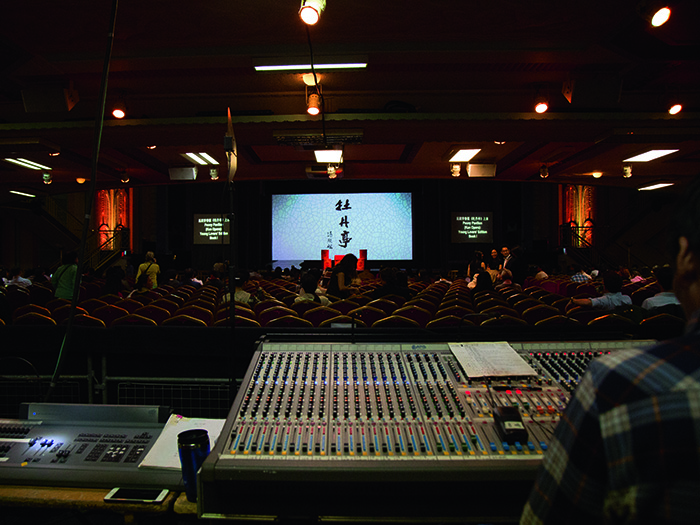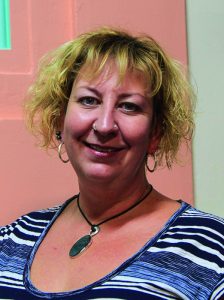Written in 1598, The Peony Pavilion is perhaps the most critically acclaimed Kun opera and one of China’s oldest forms of dramatic expression. This year the performance made a temporary home for three nights in London’s Troxy.
The Far East met East London as Troxy played host to The Peony Pavilion, an incredible spectacle produced by renowned Chinese writer Kenneth H. Y. Pai and performed by the Suzhou Kun Opera Theatre of Jiangsu Province. Similar in story to Romeo and Juliet and written at the same time, The Peony Pavilion celebrated its 400th anniversary in memory of playwrights Tang Xianzu and William Shakespeare and featured spectacular Chinese opera, coupled with a traditional Chinese orchestra and an impressive production.
Told in 27 scenes, this nine-hour opera was spread across three nights, making it the longest consecutive show that the venue has ever hosted.
Will Poole, Events and Compliance Manager at Troxy, explained: “Troxy originally opened as a grand cinema back in 1933 and regularly hosted Gracie Fields, Petula Clark, Cliff Richard and even Clark Gable. When the cinema closed down, the building remained empty for almost three years, until 1963 when a tenant was found and the London Opera Centre was created in Troxy. Run by the Royal Opera House, Covent Garden, Troxy was used primarily as a rehearsal space.
“Since then, Troxy has mainly played host to music concerts, sports events and awards ceremonies; theatre isn’t something we have dipped our toes in since those early days. It’s fantastic to see the venue being once again used for performances of this nature, after all a building of this grandeur was designed for spectaculars just like this.”

In order to host the incoming theatrical production, Troxy’s in-house production team had to make a number of major modifications to transform the space from a live events venue to a temporary theatre.
Steve Singh, Troxy’s in-house Production Manager, explained: “This was totally different from anything we’ve ever done before at Troxy. To accommodate the incoming production we increased the footprint of our house stage using ZEROdb Live, who provided additional decks so we could more than double our 40ft x 20ft stage to accommodate all the action.
“Theatre uses a very different lighting rig than the one we’re used to for live music. The Troxy house rig is designed for multifunctional use to accommodate the venue’s varied client base and had to be adapted to make it suitable for this performance. Usually our rig consists of moving heads, however this had to be changed to static lights for theatre, and an additional 120 lights were added. We used Colour Sound Experiment to supply the lighting, and they provided us with 66 ETC Source Fours, 35 PAR 64’s, eight 2Kw Fresnel Spotlights, along with two Avolites ART 2000 dimmer racks, two, eight by six Fast-Fold projector screens and two 30,000 lumen Barco HDF-W30 projectors.
“What makes Troxy so special is its status as a Grade II Listed building, however this means that there is no grid above the stage to hang the rig. Therefore, we had to utilise a floating truss to accommodate this extra lighting, adding three additional trusses to our in-house ones.”
Troxy’s in-house production team worked closely with Rachael King, Euroscope TV Production Manager, who was brought in to help oversee the venue transformation and ensure the shows ran as smoothly as possible.

King explained: “I’ve been managing relationships between Troxy, the incoming technical suppliers and the Chinese production team. The only thing brought over from China was the drapes, props and the lighting desk so Steve and I have worked together to bring in all the suppliers and accommodate what is often last minute changes. We’ve opted for a traditional theatre style lighting rig, coupled with two high end 30,000 Barco HDF-W30 projectors.
“That’s the interesting thing about The Peony Pavilion; it coupled traditional Chinese theatre and traditional costumes with a high-tech scenic backdrop that used state of the art kit. This stopped the need for any scenery changes, as this could all be indicated via the visuals on the backdrop and the on-stage props, which made the show flow much better.”
The production utilised Troxy’s in-house audio, augmented by an APB DynaSonics Spectra 32-channel analogue desk, along with 15 radio mic packs for the cast.

Myles Hayden, Troxy’s in-house Sound Engineer, explained: “The incoming Chinese production manager specifically requested an analogue desk, so we searched all over London for an APB DynaSonics 32-channel desk. We eventually found one at Hark that had been in storage for 10 years and it was amazing to see this working on a show that itself is so steeped in history. Due to the language barrier, the Chinese sound tech hasn’t been able to translate what’s on the sound desk, so I’ve been on hand to assist and support the team throughout this production process. We’re having to make use of WeChat as a form of communication to try and break down the language barrier and ensure everyone is on the same page.”
Hayden continued: “It was an interesting set up for The Peony Pavilion. The production brought a full Chinese orchestra which was positioned in front of the stage, which is where the audience usually sits. Therefore, we had to turn off certain parts of the PA and re-adjust the sound system to ensure the performance could be clearly heard by everyone within the venue. Our in-house line array is designed to cover the Circle, but because we have had to use the front of stage as an orchestra pit, the main PA was flown higher than normal to ensure the sound hits the whole audience.
“We supplemented the lower areas with a point-source PA system to ensure crisp sound throughout the whole venue. Because none of the orchestra instruments were close-miked, we used Audix Hypercardioid Pencil Condensers, which are good for miking at distance, without picking up the unwanted areas of sound.”
The Chinese production team used the two video screens that flanked the stage to run subtitles in both English and Chinese throughout the production. In addition, Troxy’s in-house display screens were utilised throughout the venue, to bring the subtitles closer to the audience on both the Ground Floor and Circle.
King continued: “The Circle in Troxy is close to the stage, which creates a really intimate atmosphere within the venue, all adding to the guests’ experience. I’ve found Troxy to be a really versatile venue that lends itself to all genres of events.”
This is the second time The Peony Pavilion has come to the UK, having first visited back in 2008. With a touring Chinese production, the team identified a number of differences between staging this show in China and the UK.
Hong Ji Wang, Audio Assistant and the team’s translator, commented: “Working in Troxy has been a great experience. Over the course of the production we witnessed a few differences from the production processes back home. For one, the stage was very different, it was much bigger than we’re used to in China and the actual size of the room was also much bigger. This is great for the performers, and although it was a change to bring The Peony Pavilion into a bigger venue, it actually worked really well.”
Sam Song, The Peony Pavilion’s UK Promoter, added: “Both Rachael and the Troxy team have worked to support us on the production, which was a determining factor when choosing a venue to host this show. It’s been very different to doing it in China, the venue is newer, the people are working much quicker – it’s a different culture and the production team we have brought in have been excellent.
“We’ve also noticed huge differences in the way tickets have been sold here and we have seen different purchasing patterns in the way people have been buying. The first night we have sold 1,200 tickets, the second night has seen about 800 tickets and the last night about 1,100, and this isn’t including any walk-ups.”
Photos: Plaster Creative Communications and Liu Xing
TPi


